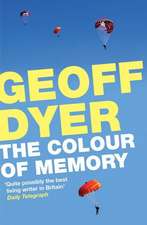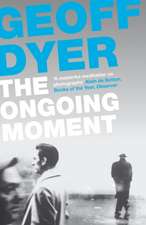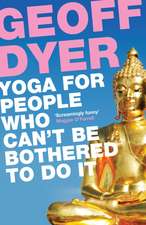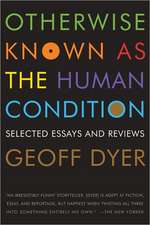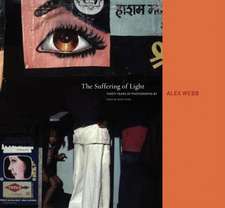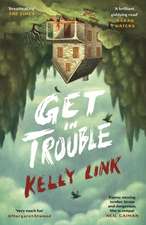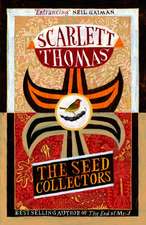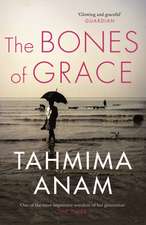Jeff in Venice, Death in Varanasi
Autor Geoff Dyeren Limba Engleză Paperback – 31 mar 2010
A Best Book of the Year: The Economist, The New Yorker, San Francisco Chronicle, Slate.com, and Time
In Venice, at the Biennale, a jaded, bellini-swigging journalist named Jeff Atman meets a beautiful woman and they embark on a passionate affair.
In Varanasi, an unnamed journalist (who may or may not be Jeff) joins thousands of pilgrims on the banks of the holy Ganges. He intends to stay for a few days but ends up remaining for months.
Their journey—as only the irrepressibly entertaining Geoff Dyer could conjure—makes for an uproarious, fiendishly inventive novel of Italy and India, longing and lust, and the prospect of neurotic enlightenment.
| Toate formatele și edițiile | Preț | Express |
|---|---|---|
| Paperback (2) | 63.44 lei 3-5 săpt. | +8.85 lei 4-10 zile |
| Canongate Books – 5 mar 2015 | 63.44 lei 3-5 săpt. | +8.85 lei 4-10 zile |
| Vintage Books USA – 31 mar 2010 | 114.79 lei 3-5 săpt. |
Preț: 114.79 lei
Nou
Puncte Express: 172
Preț estimativ în valută:
21.97€ • 22.69$ • 18.28£
21.97€ • 22.69$ • 18.28£
Carte disponibilă
Livrare economică 04-18 martie
Preluare comenzi: 021 569.72.76
Specificații
ISBN-13: 9780307390301
ISBN-10: 0307390306
Pagini: 296
Dimensiuni: 139 x 203 x 23 mm
Greutate: 0.3 kg
Editura: Vintage Books USA
ISBN-10: 0307390306
Pagini: 296
Dimensiuni: 139 x 203 x 23 mm
Greutate: 0.3 kg
Editura: Vintage Books USA
Notă biografică
Geoff Dyer is the author of three novels, a critical study of John Berger, and five genre-defying books, including But Beautiful, which was awarded the Somerset Maugham Prize, and Out of Sheer Rage, which was a National Book Critics Circle finalist. He lives in London.
Extras
On an afternoon in June 2003, when, for a brief moment, it looked as if the invasion of Iraq had not been such a bad idea after all, Jeffrey Atman set out from his flat to take a walk. He had to get out of the flat because now that the initial relief about the big picture had worn off – relief that Saddam had not turned his non-existent WMD on London, that the whole world had not been plunged into a conflagration – the myriad irritations and frustrations of the little picture were back with a vengeance. The morning’s work had bored the crap out of him. He was supposed to be writing a twelve-hundred-word so-called ‘think piece’ (intended to require zero thought on the part of the reader and scarcely more from the writer but still, somehow, beyond him) that had reached such a pitch of tedium that he’d spent
half an hour staring at the one-line email to the editor who’d commissioned it:
‘I just can’t do this shit any more. Yrs J.A.’
The screen offered a stark choice: Send or Delete. Simple as that. Click Send and it was all over with. Click Delete and he was back where he started. If taking your own life were this easy, there’d be thousands of suicides every day. Stub your toe on the way to the bathroom. Click. Get marmalade on your cuff while eating toast. Click. It starts raining as soon as you leave the house and your brolly’s upstairs. What to do? Go back up and get it, leave without it and get soaked, or . . . Click. Even as he stared at the message, as he sat there on the very brink of sending it, he knew that he would not. The thought of sending it was enough to deter him from doing so. So instead of sending the message or getting on with this article about a ‘controversial’ new art installation at the Serpentine he sat there, paralysed, doing neither.
To break the spell he clicked Delete and left the house as if fleeing the scene of some dreary, as yet uncommitted crime. Hopefully fresh air (if you could call it that) and movement would revive him, enable him to spend the evening finishing this stupid article and getting ready to fly to Venice the following afternoon. And when he got to Venice? More shit to set up and churn out. He was meant to be covering the
opening of the Biennale – that was fine, that was a doddle – but then this interview with Julia Berman had come up (or at least a probable interview with Julia Berman) and now, in addition to writing about the Biennale, he was supposed to persuade her – to beg, plead and generally demean himself – to do an interview that would guarantee even more publicity for her daughter’s forthcoming album and further inflate the bloated reputation of Steven Morison, the dad, the famously overrated artist. On top of that he was supposed to make
sure – at the very least – that she agreed to grant Kulchur exclusive rights to reproduce a drawing Morison had made of her, a drawing never previously published, and not even seen by anyone at Kulchur, but which, due to the fear that a rival publication might get hold of it, had acquired the status of a rare and valuable artefact. The value of any individual part of this arrangement was irrelevant. What mattered was that in marketing and publicity terms (or, from an editorial point of view, circulation and advertising) the planets were all in alignment. He had to interview her, had to come away with the picture and the right to reproduce it. Christ Almighty . . . A woman pushing an all-terrain pram glanced quickly at him and looked away even more quickly. He must have been doing that thing, not talking aloud to himself but forming words with his mouth, unconsciously lip-synching the torrent of grievances that tumbled constantly through his head. He held his mouth firmly shut. He had to stop doing that. Of all the things he had to stop doing or start doing, that was right at the top of the list. But how do you stop doing something when you are completely unaware that you’re doing it? Charlotte was the one who pointed it out to him, when they were still together, but he’d probably been doing it for years before that. Towards the end that’s how she would refer to this habit of muted karaoke. ‘That thing,’ she would say. ‘You’re doing that thing again.’ At first it had been a joke between them. Then, like everything else in a marriage, it stopped being a joke and became a bone of contention, an issue, a source of resentment, one of the many things that
rendered life on Planet Jeff – as she termed the uninhabitable wasteland of their marriage – intolerable. What she never understood, he claimed, was that life on Planet Jeff was intolerable for him too, more so, in fact, than for anyone else. That, she claimed, was precisely her point.
These days he had no one to alert him to the fact that he was walking down the street mouthing out his thoughts. It was a very bad habit. He had to stop doing it. But it was possible that, as he was walking down the street, he was forming the words, ‘This is a very bad habit, I must stop doing it, it’s even possible that as I walk down the street I am forming these words . . .’ He glued his mouth closed again as a way of closing off this line of thought. The only way to stop this habit of forming the words with his lips was to stop forming the words in his brain, to stop having the thoughtsthat formed the words. How to do that? It was a major undertaking, the kind of thing you got sorted out at an ashram, not cosmetically at a beautician’s. Eventually everything that is going on inside will manifest itself externally. The interior will be exteriorized . . . He made an effort to smile. If he could get into the habit of doing this constantly, so that his face looked cheerful in repose, then the exterior might be interiorized, he might start to beam internally. Except it was so tiring, keeping smiling like that. The moment he stopped concentrating on smiling his face lapsed back into its unbeaming norm. ‘Norm’ was certainly the operative word. Most of the people passing by looked miserable as a disappointing sin. Many of them, if their faces were anything to go by, looked like their souls were scowling. Maybe Alex Ferguson was right, maybe chewing gum ferociously was the only answer. If so, the solution was at hand in the form of a newsagent’s.
Behind the counter was a young Indian girl. How old? Seventeen? Eighteen? Gorgeous, though, and with a bright smile, unusual in her line of work. Maybe she was just starting out, taking time off from her A-levels or whatever they were called these days, filling in for her surly father, who, though he spoke little English, had so thoroughly adjusted to British life that he looked every bit as pissed off as someone whose ancestors had come over with the Normans. Atman was always taken aback by his exchanges with this guy, by the way that, brief though they were, they managed to sap any sense of well-being he’d had on entering the premises. It was difficult to repress the habit of saying ‘please’ and ‘thank you’ but, as a reprisal, a protest, at the guy’s refusal to abide by the basic courtesies, Jeff always picked up whatever he was buying – the paper, a bar of chocolate – and handed over the money silently. Not at all like that today, though. Jeff gave her a pound coin. She handed him his change, met his eyes with her own, smiled. Give her a few years and she would scarcely pay any attention to whoever she was serving, would just look up, grab the money and not try to make of the exchange anything other than the low-level financial transaction it was. But for now it was quite magical. It was so easy to make people (i.e., Jeff) feel a bit better about life (i.e., himself), so easy to make the world a slightly better place. The mystery was why so many people – and there were plenty of occasions when he could be counted among their number – opted to make it a worse one. He went away feeling happier than when he’d come in, charmed by her, even sort of aroused. Not aroused exactly, but curious. Curious about what kind of underwear she might have been wearing beneath her T-shirt and low-waisted jeans, exactly the kind of thinking, presumably, that many in the Muslim community – the so-called Muslim community – used as justification for the full-face veil. He had read, a few days earlier, that British Muslims were the most embittered, disgruntled and generally fed up of any in Europe. So why was there all this talk about the need for Muslims to integrate into British life? The fact that they were so pissed off was a sign of profound assimilation. What better proof could there be?
Chewing over this important Topic – at the last moment he’d opted for chocolate rather than gum – Jeff walked on to Regent’s Park. The fact that he should, at this point, have returned home and got back to work meant that he kept going, walked through the park under the cloud-swollen sky and crossed Marylebone Road.
A creature of deep habit, Atman was programmed, the moment he set foot on Marylebone High Street, to go to Patisserie Valerie’s and order a black coffee with a side-order of hot milk and an almond croissant – even though he didn’t want either. Normally he came here in the mornings but now, in the post-lunch doldrums, it was too late for coffee, too early for tea (it was that time of the day, in fact, when no
one wanted anything) and far too late to read the paper – which he’d read extra thoroughly, hours earlier, as a way of putting off writing his stupid think piece. Fortunately he had a book for company, Mary McCarthy’s Venice Observed. He’d first read it four years ago, after getting back from the 1999 Biennale, and had started rereading it now – along with the other standard books on Venice – as preparation for the return trip. His almond croissant was the size and complexion of a small roast turkey and in the time it took to chomp through it he was able to read the entire section on Giorgione’s The Tempest.
McCarthy reckoned there was ‘a new melancholy in the chronic leisure’ of the renaissance nobility. Could a similar melancholy be detected among the leisured ladies of Marylebone High Street? Apparently not. Like everything else leisure had changed with the times, had sped up. So there was actually a kind of urgency about these wives of investment bankers and hedge fund managers negotiating the brief interval between lunch and picking up their kids from the lycée or the American School. They had learned the lesson of leisure, the importance of contriving things so that there wasn’t time to be unhappy. Back in the Renaissance time mounted up without passing so that sudden storms are forever on the point of breaking. Hence the melancholy that ‘suffuses Giorgione’s paintings, a breath of unrest that just fails to stir the foliage of the trees . . . It is the absolute fixity of his scenes that makes this strange impression.’
Atman hadn’t seen the painting in 1999 but it was one of the things he was most looking forward to this time around(if he had the time): seeing The Tempest, gauging the painting– and the city – against what McCarthy had written about it.
Stuffed with pastry, tense with coffee, he left Valerie’s and browsed through the Oxfam bookshop, all part of the normal pattern of a walk along Marylebone High Street. What was completely out of the ordinary was to find himself looking in the window of an expensive-looking hairdresser’s. He had never paid more than ten pounds (with tip), had not had his hair cut anywhere but a barber’s for thirty years, not since the unisex craze of the mid-seventies, and, most importantly of all, he didn’t need a haircut. But here he was, opening the door, entering, taking the first steps towards doing something he’d been thinking about for years: getting his hair dyed. For a long time he’d thought of grey hair as a symptom, a synonym of inner dreariness, and had accepted it, accordingly, as inevitable – but all that was about to change. He shut the door behind him. The hair-conditioned interior smelled nicely, of product and potion, and looked conservative – not the kind of place where getting your hair dyed anything other than orange or pillar-box red marked you down as a hopeless square. It had the atmosphere, almost, of a clinic or spa. A man with shapeless brown hair – was it a subtly suggestive ploy that hairdressers so often looked like they needed a haircut? – asked if he had an appointment.
‘No, I don’t. But I wondered if you had a slot now.’
He looked at the appointment book, heavy and muchamended, a kind of Domesday Book of the hair world.
‘Cut and wash?’
‘Yes. Actually, I was wondering . . .’ He felt as embarrassed as a character in a 1950s novel buying French letters. ‘Might it be possible to perhaps get my hair dyed?’ The guy, who had seemed only marginally interested, at this point became more focused.
‘Yes,’ he said. ‘Dyeing is an art like everything else. We do it exceptionally well. We do it so it looks real.’
‘That’s Sylvia Plath, right?’
‘Indeed.’ A hairdresser who quoted poetry. Well, this really was an upmarket place. Or perhaps this kind of thing came as standard in this part of London. Jeff would have liked to respond with some kind of counter-allusion but could dredge nothing up. He explained that he didn’t want anything too radical, wanted it to be subtle.
‘Like this?’ the guy smiled.
‘Like what?’
‘Like mine.’
‘Wow! Yes, exactly.’ It was hard to believe his hair was dyed – it looked entirely natural and he still had a little grey at the temples. They moved into more detailed negotiations. It would cost a fortune but the great thing was that in ten minutes – he was lucky, the guy said, they’d just had a cancellation – Jeff was in the chair having his hair slightly cut and dyed . . . ‘Discreetly, very quietly,’ he thought to himself, but it was too late now to make use of this retaliatory bit of Plath: the man who’d welcomed him was evidently some kind of maitre d’; the actual dyeing was done by a young woman with multiple piercings (eyebrow, nose, a saliva-gleam of tongue stud), who preferred to work in silence. Fine by Atman. He was preoccupied, as he sat there, by the implications of coming out as a man who dyed his hair. It was the kind of thing you did if you emigrated to America, went to begin a new life in a place where no one knew your former greyhaired self – but he was reinventing himself on his home turf, in London, on Marylebone High Street. You grow older imperceptibly. Your knees begin to hurt perceptibly. They don’t get better. Occasionally they get worse and then improve but they never get back to what they were before. You begin to accept that you have a bad knee. You adjust your walk to compensate and alleviate but, by doing so, you set the scene for lower-back pain. These things were complicated and sometimes impossible to fix. And now one of the symptoms of ageing – possibly not the worst, but certainly the most visible – was being dealt with, painlessly and quickly. It was as simple as that. All it took was money and a bit of time. Apart from that, you just sat under one of these Martian dryers, waiting, wondering if you should have opted for a lighter shade – or a darker one. Or just a trim.
The moment arrived, the moment of untruth. The silver foil was taken off. Jeff was tilted back over the basin. His hair was washed with almond-scented shampoo, rinsed. Flipped back into upright mode he was confronted, in the mirror, with his new hair. Wet, it looked Thunderbirds-black. Having it dried was like watching a Polaroid in reverse. The black gradually faded to a convincing shade of rejuvenation. It had worked! His hair was dark without looking dyed. He looked ten years younger! He was so pleased by the result
that he could have spent ages gazing at himself adoringly in the mirror. It was him but not him: dark-haired him, plausibly youthful him. All in all it was the best eighty quid he’d ever spent in his life. (The only thing that could have made him happier was to have found a way to claim it back on expenses as necessary preparation and research for the Biennale.) And tomorrow he’d be on his way to Venice. Life was sweet, a lot sweeter than it had been three hours previously when he’d left the house as a way of putting off writing a stupid article – which still had to be written. If it hadn’t been for that, if he didn’t have to get back and write his stupid article, he’d have been tempted to drop in at the newsagent’s again, to buy another Topic and see if that young Indian girl was still there.
Back home, back at his desk, the perennial question kept cropping up: how much longer could he keep doing this stuff for? For about two minutes at a time, it turned out, but eventually these two minute increments – punctuated by emails pinging in and out – mounted up. God, what a miserable way to earn a living. Back in the days when his hair was naturally this colour – or darker – it had been a thrill writing stuff like this, or at least seeing it in print was thrilling. The fact that his dyed hair had sort of rolled back the years brought home how little progress he’d made in the intervening decade and a half. Here he was, doing the same shit he’d been doing fifteen years ago. Not that that made doing it any easier; it just made it more depressing. As always he struggled to get anywhere near the required word length and then, after padding and expanding, ended up with too many words and had to expend still more energy cutting it back to the required length (which always turned out to be more than was actually published). Still, by eleven o’clock he’d finished, cracked it, done it. He celebrated with camomile tea – there were days of heavy drinking ahead – and the remains of Newsnight, amazed at how grey Paxman’s hair had become.
From the Hardcover edition.
half an hour staring at the one-line email to the editor who’d commissioned it:
‘I just can’t do this shit any more. Yrs J.A.’
The screen offered a stark choice: Send or Delete. Simple as that. Click Send and it was all over with. Click Delete and he was back where he started. If taking your own life were this easy, there’d be thousands of suicides every day. Stub your toe on the way to the bathroom. Click. Get marmalade on your cuff while eating toast. Click. It starts raining as soon as you leave the house and your brolly’s upstairs. What to do? Go back up and get it, leave without it and get soaked, or . . . Click. Even as he stared at the message, as he sat there on the very brink of sending it, he knew that he would not. The thought of sending it was enough to deter him from doing so. So instead of sending the message or getting on with this article about a ‘controversial’ new art installation at the Serpentine he sat there, paralysed, doing neither.
To break the spell he clicked Delete and left the house as if fleeing the scene of some dreary, as yet uncommitted crime. Hopefully fresh air (if you could call it that) and movement would revive him, enable him to spend the evening finishing this stupid article and getting ready to fly to Venice the following afternoon. And when he got to Venice? More shit to set up and churn out. He was meant to be covering the
opening of the Biennale – that was fine, that was a doddle – but then this interview with Julia Berman had come up (or at least a probable interview with Julia Berman) and now, in addition to writing about the Biennale, he was supposed to persuade her – to beg, plead and generally demean himself – to do an interview that would guarantee even more publicity for her daughter’s forthcoming album and further inflate the bloated reputation of Steven Morison, the dad, the famously overrated artist. On top of that he was supposed to make
sure – at the very least – that she agreed to grant Kulchur exclusive rights to reproduce a drawing Morison had made of her, a drawing never previously published, and not even seen by anyone at Kulchur, but which, due to the fear that a rival publication might get hold of it, had acquired the status of a rare and valuable artefact. The value of any individual part of this arrangement was irrelevant. What mattered was that in marketing and publicity terms (or, from an editorial point of view, circulation and advertising) the planets were all in alignment. He had to interview her, had to come away with the picture and the right to reproduce it. Christ Almighty . . . A woman pushing an all-terrain pram glanced quickly at him and looked away even more quickly. He must have been doing that thing, not talking aloud to himself but forming words with his mouth, unconsciously lip-synching the torrent of grievances that tumbled constantly through his head. He held his mouth firmly shut. He had to stop doing that. Of all the things he had to stop doing or start doing, that was right at the top of the list. But how do you stop doing something when you are completely unaware that you’re doing it? Charlotte was the one who pointed it out to him, when they were still together, but he’d probably been doing it for years before that. Towards the end that’s how she would refer to this habit of muted karaoke. ‘That thing,’ she would say. ‘You’re doing that thing again.’ At first it had been a joke between them. Then, like everything else in a marriage, it stopped being a joke and became a bone of contention, an issue, a source of resentment, one of the many things that
rendered life on Planet Jeff – as she termed the uninhabitable wasteland of their marriage – intolerable. What she never understood, he claimed, was that life on Planet Jeff was intolerable for him too, more so, in fact, than for anyone else. That, she claimed, was precisely her point.
These days he had no one to alert him to the fact that he was walking down the street mouthing out his thoughts. It was a very bad habit. He had to stop doing it. But it was possible that, as he was walking down the street, he was forming the words, ‘This is a very bad habit, I must stop doing it, it’s even possible that as I walk down the street I am forming these words . . .’ He glued his mouth closed again as a way of closing off this line of thought. The only way to stop this habit of forming the words with his lips was to stop forming the words in his brain, to stop having the thoughtsthat formed the words. How to do that? It was a major undertaking, the kind of thing you got sorted out at an ashram, not cosmetically at a beautician’s. Eventually everything that is going on inside will manifest itself externally. The interior will be exteriorized . . . He made an effort to smile. If he could get into the habit of doing this constantly, so that his face looked cheerful in repose, then the exterior might be interiorized, he might start to beam internally. Except it was so tiring, keeping smiling like that. The moment he stopped concentrating on smiling his face lapsed back into its unbeaming norm. ‘Norm’ was certainly the operative word. Most of the people passing by looked miserable as a disappointing sin. Many of them, if their faces were anything to go by, looked like their souls were scowling. Maybe Alex Ferguson was right, maybe chewing gum ferociously was the only answer. If so, the solution was at hand in the form of a newsagent’s.
Behind the counter was a young Indian girl. How old? Seventeen? Eighteen? Gorgeous, though, and with a bright smile, unusual in her line of work. Maybe she was just starting out, taking time off from her A-levels or whatever they were called these days, filling in for her surly father, who, though he spoke little English, had so thoroughly adjusted to British life that he looked every bit as pissed off as someone whose ancestors had come over with the Normans. Atman was always taken aback by his exchanges with this guy, by the way that, brief though they were, they managed to sap any sense of well-being he’d had on entering the premises. It was difficult to repress the habit of saying ‘please’ and ‘thank you’ but, as a reprisal, a protest, at the guy’s refusal to abide by the basic courtesies, Jeff always picked up whatever he was buying – the paper, a bar of chocolate – and handed over the money silently. Not at all like that today, though. Jeff gave her a pound coin. She handed him his change, met his eyes with her own, smiled. Give her a few years and she would scarcely pay any attention to whoever she was serving, would just look up, grab the money and not try to make of the exchange anything other than the low-level financial transaction it was. But for now it was quite magical. It was so easy to make people (i.e., Jeff) feel a bit better about life (i.e., himself), so easy to make the world a slightly better place. The mystery was why so many people – and there were plenty of occasions when he could be counted among their number – opted to make it a worse one. He went away feeling happier than when he’d come in, charmed by her, even sort of aroused. Not aroused exactly, but curious. Curious about what kind of underwear she might have been wearing beneath her T-shirt and low-waisted jeans, exactly the kind of thinking, presumably, that many in the Muslim community – the so-called Muslim community – used as justification for the full-face veil. He had read, a few days earlier, that British Muslims were the most embittered, disgruntled and generally fed up of any in Europe. So why was there all this talk about the need for Muslims to integrate into British life? The fact that they were so pissed off was a sign of profound assimilation. What better proof could there be?
Chewing over this important Topic – at the last moment he’d opted for chocolate rather than gum – Jeff walked on to Regent’s Park. The fact that he should, at this point, have returned home and got back to work meant that he kept going, walked through the park under the cloud-swollen sky and crossed Marylebone Road.
A creature of deep habit, Atman was programmed, the moment he set foot on Marylebone High Street, to go to Patisserie Valerie’s and order a black coffee with a side-order of hot milk and an almond croissant – even though he didn’t want either. Normally he came here in the mornings but now, in the post-lunch doldrums, it was too late for coffee, too early for tea (it was that time of the day, in fact, when no
one wanted anything) and far too late to read the paper – which he’d read extra thoroughly, hours earlier, as a way of putting off writing his stupid think piece. Fortunately he had a book for company, Mary McCarthy’s Venice Observed. He’d first read it four years ago, after getting back from the 1999 Biennale, and had started rereading it now – along with the other standard books on Venice – as preparation for the return trip. His almond croissant was the size and complexion of a small roast turkey and in the time it took to chomp through it he was able to read the entire section on Giorgione’s The Tempest.
McCarthy reckoned there was ‘a new melancholy in the chronic leisure’ of the renaissance nobility. Could a similar melancholy be detected among the leisured ladies of Marylebone High Street? Apparently not. Like everything else leisure had changed with the times, had sped up. So there was actually a kind of urgency about these wives of investment bankers and hedge fund managers negotiating the brief interval between lunch and picking up their kids from the lycée or the American School. They had learned the lesson of leisure, the importance of contriving things so that there wasn’t time to be unhappy. Back in the Renaissance time mounted up without passing so that sudden storms are forever on the point of breaking. Hence the melancholy that ‘suffuses Giorgione’s paintings, a breath of unrest that just fails to stir the foliage of the trees . . . It is the absolute fixity of his scenes that makes this strange impression.’
Atman hadn’t seen the painting in 1999 but it was one of the things he was most looking forward to this time around(if he had the time): seeing The Tempest, gauging the painting– and the city – against what McCarthy had written about it.
Stuffed with pastry, tense with coffee, he left Valerie’s and browsed through the Oxfam bookshop, all part of the normal pattern of a walk along Marylebone High Street. What was completely out of the ordinary was to find himself looking in the window of an expensive-looking hairdresser’s. He had never paid more than ten pounds (with tip), had not had his hair cut anywhere but a barber’s for thirty years, not since the unisex craze of the mid-seventies, and, most importantly of all, he didn’t need a haircut. But here he was, opening the door, entering, taking the first steps towards doing something he’d been thinking about for years: getting his hair dyed. For a long time he’d thought of grey hair as a symptom, a synonym of inner dreariness, and had accepted it, accordingly, as inevitable – but all that was about to change. He shut the door behind him. The hair-conditioned interior smelled nicely, of product and potion, and looked conservative – not the kind of place where getting your hair dyed anything other than orange or pillar-box red marked you down as a hopeless square. It had the atmosphere, almost, of a clinic or spa. A man with shapeless brown hair – was it a subtly suggestive ploy that hairdressers so often looked like they needed a haircut? – asked if he had an appointment.
‘No, I don’t. But I wondered if you had a slot now.’
He looked at the appointment book, heavy and muchamended, a kind of Domesday Book of the hair world.
‘Cut and wash?’
‘Yes. Actually, I was wondering . . .’ He felt as embarrassed as a character in a 1950s novel buying French letters. ‘Might it be possible to perhaps get my hair dyed?’ The guy, who had seemed only marginally interested, at this point became more focused.
‘Yes,’ he said. ‘Dyeing is an art like everything else. We do it exceptionally well. We do it so it looks real.’
‘That’s Sylvia Plath, right?’
‘Indeed.’ A hairdresser who quoted poetry. Well, this really was an upmarket place. Or perhaps this kind of thing came as standard in this part of London. Jeff would have liked to respond with some kind of counter-allusion but could dredge nothing up. He explained that he didn’t want anything too radical, wanted it to be subtle.
‘Like this?’ the guy smiled.
‘Like what?’
‘Like mine.’
‘Wow! Yes, exactly.’ It was hard to believe his hair was dyed – it looked entirely natural and he still had a little grey at the temples. They moved into more detailed negotiations. It would cost a fortune but the great thing was that in ten minutes – he was lucky, the guy said, they’d just had a cancellation – Jeff was in the chair having his hair slightly cut and dyed . . . ‘Discreetly, very quietly,’ he thought to himself, but it was too late now to make use of this retaliatory bit of Plath: the man who’d welcomed him was evidently some kind of maitre d’; the actual dyeing was done by a young woman with multiple piercings (eyebrow, nose, a saliva-gleam of tongue stud), who preferred to work in silence. Fine by Atman. He was preoccupied, as he sat there, by the implications of coming out as a man who dyed his hair. It was the kind of thing you did if you emigrated to America, went to begin a new life in a place where no one knew your former greyhaired self – but he was reinventing himself on his home turf, in London, on Marylebone High Street. You grow older imperceptibly. Your knees begin to hurt perceptibly. They don’t get better. Occasionally they get worse and then improve but they never get back to what they were before. You begin to accept that you have a bad knee. You adjust your walk to compensate and alleviate but, by doing so, you set the scene for lower-back pain. These things were complicated and sometimes impossible to fix. And now one of the symptoms of ageing – possibly not the worst, but certainly the most visible – was being dealt with, painlessly and quickly. It was as simple as that. All it took was money and a bit of time. Apart from that, you just sat under one of these Martian dryers, waiting, wondering if you should have opted for a lighter shade – or a darker one. Or just a trim.
The moment arrived, the moment of untruth. The silver foil was taken off. Jeff was tilted back over the basin. His hair was washed with almond-scented shampoo, rinsed. Flipped back into upright mode he was confronted, in the mirror, with his new hair. Wet, it looked Thunderbirds-black. Having it dried was like watching a Polaroid in reverse. The black gradually faded to a convincing shade of rejuvenation. It had worked! His hair was dark without looking dyed. He looked ten years younger! He was so pleased by the result
that he could have spent ages gazing at himself adoringly in the mirror. It was him but not him: dark-haired him, plausibly youthful him. All in all it was the best eighty quid he’d ever spent in his life. (The only thing that could have made him happier was to have found a way to claim it back on expenses as necessary preparation and research for the Biennale.) And tomorrow he’d be on his way to Venice. Life was sweet, a lot sweeter than it had been three hours previously when he’d left the house as a way of putting off writing a stupid article – which still had to be written. If it hadn’t been for that, if he didn’t have to get back and write his stupid article, he’d have been tempted to drop in at the newsagent’s again, to buy another Topic and see if that young Indian girl was still there.
Back home, back at his desk, the perennial question kept cropping up: how much longer could he keep doing this stuff for? For about two minutes at a time, it turned out, but eventually these two minute increments – punctuated by emails pinging in and out – mounted up. God, what a miserable way to earn a living. Back in the days when his hair was naturally this colour – or darker – it had been a thrill writing stuff like this, or at least seeing it in print was thrilling. The fact that his dyed hair had sort of rolled back the years brought home how little progress he’d made in the intervening decade and a half. Here he was, doing the same shit he’d been doing fifteen years ago. Not that that made doing it any easier; it just made it more depressing. As always he struggled to get anywhere near the required word length and then, after padding and expanding, ended up with too many words and had to expend still more energy cutting it back to the required length (which always turned out to be more than was actually published). Still, by eleven o’clock he’d finished, cracked it, done it. He celebrated with camomile tea – there were days of heavy drinking ahead – and the remains of Newsnight, amazed at how grey Paxman’s hair had become.
From the Hardcover edition.
Recenzii
“Profoundly haunting and fearless. . . . Dyer at his best.”
—Pico Iyer, The New York Times Book Review
“An original, affecting, and unexpected book. . . . [Full of] wonderful observations, pungent and funny.”
—James Wood, The New Yorker
“Madly compelling. . . . A virtuosic melding of style and repertoire that come together as a sort of yogic ‘one.’”
—The Boston Globe
“Intoxicating. . . . A roller-coaster ride through the peaks and depths of sensual and spiritual abandonment-as-fulfillment.”
—National Geographic Traveler
“Dyer is very funny. . . a post-modern Kingsley Amis.”
—Zadie Smith, author of White Teeth
“A comic sexual-spiritual odyssey. . . . Dyer’s prose is muscular, sometimes lighthearted and ribald.”
—St. Louis Post-Dispatch
“Astonishingly original. . . . An unforgettable book.”
—The Oregonian
“Geoff Dyer is one of my favorite of all contemporary writers. . . . Jeff in Venice [is] a sad, funny, lyrical, furious story of an ordinary man’s momentary redemption and decline.”
—Alain de Botton, author of How Proust Can Change Your Life
“Deft and daring. . . . A perceptive, engaging travelogue.”
— The Philadelphia Inquirer
“Detailed and engaging. . . . Quite the mind game. . . . In Dyer’s enigmatic novel, every reader will have to discover his or her own answers.”
—San Francisco Chronicle
“Brilliant. . . . Dyer doesn’t reference Thomas Mann’s Death in Venice for nothing: Jeff in Venice picks up Mann’s themes of yearning for beauty and lost youth, but also Mann’s deadly seriousness of artistic purpose. . . . [Dyer’s] art is one of languid, suspended watching, lulling the reader into a morbid [Henry] Jamesian arousal.”
—New York Observer
“A raucous delight. Jeff in Venice, Death in Varanasi is truly surprising—very funny, full of nerve, gutsy and delicious. Venice will never be the same again!”
—Michael Ondaatje, author of The English Patient
“Dyer looks to the West and the East in [this] imaginative examination of self and romance.”
—New York Post
“Jeff in Venice, Death in Varanasi is serious fiction; learned travelogue; funny, arch and sad; a cynic’s ascent into redemptive love and a stoner’s descent into ‘Gone-Native’ madness. It drips with Geoff Dyer’s derelict luminosity.”
—David Mitchell, author of Cloud Atlas
“Musical and wildly intelligent. . . . [Dyer] has outdone himself, offering two narratives that play off one another to create an entirely new set of possibilities—a third story—in the reader’s mind. . . . It grips you in unexpected ways.”
—Time Out New York
“A coy curmudgeon, a sly cosmopole, Casanova on a lark, Turner on a binge, a swami whami and arm-twister—Geoff Dyer is the Mann!”
—Lawrence Weschler, author of Mr. Wilson’s Cabinet of Wonder
“Beautifully crafted. . . . A career-best performance.”
—The Sunday Telegraph (London)
“Smart, provocative, often very funny, but ultimately deeply sobering, Jeff in Venice, Death in Varanasi is a contender for the most original, and the cleverest, novel of the year.”
—The Daily Telegraph (London)
“Jeff in Venice, Death in Varanasi is the hysterically funny, hesitantly mystical and gleeful adventure of one major superhero soul—Atman. I have never read anything like it and though no doubt others will go on writing novels as before, the earth has definitely shifted beneath my feet.”
—Deborah Baker, author of A Blue Hand
“As always with Dyer, his writing is illuminating, surprising and totally original.”
—Daily Mail (London)
“Riveting. I love this book. Moments of wit, humanity, and intelligence are to be found on every page here. Dyer can write as beautifully as Lawrence and Proust. I don’t ever want to be without his brilliant mind to turn to.”
—Nadeem Aslam, author of The Wasted Vigil
“Dyer is a witty and concise observer of landscapes: social, geographical and emotional. . . . [His] eccentric charm and barbed perceptiveness will hook you to the end.”
—The Times (London)
“A wonderfully entertaining book. . . . A prodigious display of virtuosity. . . . Dazzling and peculiar.”
—The Sunday Times (London)
“Dyer is the most companionable writer at work today and he gives us an extremely involving guided tour of two cities and a man’s disintegrating self (or, as the Hindus call it, the “atman”).”
—Edmund White, author of A Boy’s Own Story
“Delivered with laconic wit and an evocative sense of place, Dyer’s effortlessly readable prose is shot through with psychological insight, truth and an eye for travelogue detail.”
—Metro (London)
“Funny and insightful. . . . An amusing and intelligent exploration of some of life’s big questions.”
—The Observer (London)
“Geoff Dyer is a True Original—one of those rare voices in contemporary literature that never ceases to surprise, disturb and delight. A must read for our confused and perplexing times.”
—William Boyd, author of Nat Tate: An American Artist, 1928-1960
“Dyer’s smart and exactingly detailed [novel] would serve as a welcome travelling companion to the Mediterranean or the Ganges.”
—The Toronto Star
—Pico Iyer, The New York Times Book Review
“An original, affecting, and unexpected book. . . . [Full of] wonderful observations, pungent and funny.”
—James Wood, The New Yorker
“Madly compelling. . . . A virtuosic melding of style and repertoire that come together as a sort of yogic ‘one.’”
—The Boston Globe
“Intoxicating. . . . A roller-coaster ride through the peaks and depths of sensual and spiritual abandonment-as-fulfillment.”
—National Geographic Traveler
“Dyer is very funny. . . a post-modern Kingsley Amis.”
—Zadie Smith, author of White Teeth
“A comic sexual-spiritual odyssey. . . . Dyer’s prose is muscular, sometimes lighthearted and ribald.”
—St. Louis Post-Dispatch
“Astonishingly original. . . . An unforgettable book.”
—The Oregonian
“Geoff Dyer is one of my favorite of all contemporary writers. . . . Jeff in Venice [is] a sad, funny, lyrical, furious story of an ordinary man’s momentary redemption and decline.”
—Alain de Botton, author of How Proust Can Change Your Life
“Deft and daring. . . . A perceptive, engaging travelogue.”
— The Philadelphia Inquirer
“Detailed and engaging. . . . Quite the mind game. . . . In Dyer’s enigmatic novel, every reader will have to discover his or her own answers.”
—San Francisco Chronicle
“Brilliant. . . . Dyer doesn’t reference Thomas Mann’s Death in Venice for nothing: Jeff in Venice picks up Mann’s themes of yearning for beauty and lost youth, but also Mann’s deadly seriousness of artistic purpose. . . . [Dyer’s] art is one of languid, suspended watching, lulling the reader into a morbid [Henry] Jamesian arousal.”
—New York Observer
“A raucous delight. Jeff in Venice, Death in Varanasi is truly surprising—very funny, full of nerve, gutsy and delicious. Venice will never be the same again!”
—Michael Ondaatje, author of The English Patient
“Dyer looks to the West and the East in [this] imaginative examination of self and romance.”
—New York Post
“Jeff in Venice, Death in Varanasi is serious fiction; learned travelogue; funny, arch and sad; a cynic’s ascent into redemptive love and a stoner’s descent into ‘Gone-Native’ madness. It drips with Geoff Dyer’s derelict luminosity.”
—David Mitchell, author of Cloud Atlas
“Musical and wildly intelligent. . . . [Dyer] has outdone himself, offering two narratives that play off one another to create an entirely new set of possibilities—a third story—in the reader’s mind. . . . It grips you in unexpected ways.”
—Time Out New York
“A coy curmudgeon, a sly cosmopole, Casanova on a lark, Turner on a binge, a swami whami and arm-twister—Geoff Dyer is the Mann!”
—Lawrence Weschler, author of Mr. Wilson’s Cabinet of Wonder
“Beautifully crafted. . . . A career-best performance.”
—The Sunday Telegraph (London)
“Smart, provocative, often very funny, but ultimately deeply sobering, Jeff in Venice, Death in Varanasi is a contender for the most original, and the cleverest, novel of the year.”
—The Daily Telegraph (London)
“Jeff in Venice, Death in Varanasi is the hysterically funny, hesitantly mystical and gleeful adventure of one major superhero soul—Atman. I have never read anything like it and though no doubt others will go on writing novels as before, the earth has definitely shifted beneath my feet.”
—Deborah Baker, author of A Blue Hand
“As always with Dyer, his writing is illuminating, surprising and totally original.”
—Daily Mail (London)
“Riveting. I love this book. Moments of wit, humanity, and intelligence are to be found on every page here. Dyer can write as beautifully as Lawrence and Proust. I don’t ever want to be without his brilliant mind to turn to.”
—Nadeem Aslam, author of The Wasted Vigil
“Dyer is a witty and concise observer of landscapes: social, geographical and emotional. . . . [His] eccentric charm and barbed perceptiveness will hook you to the end.”
—The Times (London)
“A wonderfully entertaining book. . . . A prodigious display of virtuosity. . . . Dazzling and peculiar.”
—The Sunday Times (London)
“Dyer is the most companionable writer at work today and he gives us an extremely involving guided tour of two cities and a man’s disintegrating self (or, as the Hindus call it, the “atman”).”
—Edmund White, author of A Boy’s Own Story
“Delivered with laconic wit and an evocative sense of place, Dyer’s effortlessly readable prose is shot through with psychological insight, truth and an eye for travelogue detail.”
—Metro (London)
“Funny and insightful. . . . An amusing and intelligent exploration of some of life’s big questions.”
—The Observer (London)
“Geoff Dyer is a True Original—one of those rare voices in contemporary literature that never ceases to surprise, disturb and delight. A must read for our confused and perplexing times.”
—William Boyd, author of Nat Tate: An American Artist, 1928-1960
“Dyer’s smart and exactingly detailed [novel] would serve as a welcome travelling companion to the Mediterranean or the Ganges.”
—The Toronto Star
Descriere
Descriere de la o altă ediție sau format:
Winner of the Bollinger Everyman Wodehouse Prize and a New York Times Notable Book of the Year
Winner of the Bollinger Everyman Wodehouse Prize and a New York Times Notable Book of the Year

